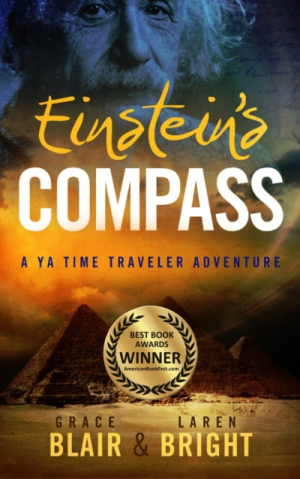Einstein's Compass
A YA Time Traveler Adventure
In Grace Blair and Laren Bright’s young adult fantasy novel Einstein’s Compass, a boy struggles with supernatural forces of light and darkness, hoping to find his place within it all.
Jealous of his brother’s success as an Atlantean priest, a fallen angel of light, Raka, is determined to prove his strength. After stealing and drinking a vial of DNA meant for a medical treatment, Raka transforms into a shape-shifting serpent who’s bent on revenge. He has the command of an army at his fingertips, and an almost unkillable form, but Raka also needs a valuable compass, the Shamir, the possession of which results in great power.
Many lifetimes later, Albert Einstein finds himself in possession of the compass, though he does not understand its power. As Raka hunts Albert down, the young genius relies on his brilliant mind and his spiritual companions as he works to unlock his consciousness and ascend toward the light, all in the hopes of defeating Raka once and for all.
Bright descriptions help to bring the book’s settings to life; these range from ancient Atlantis to twentieth-century Germany. Scenes in which Raka tortures and eats his victims limb by limb are graphic, though the book on the whole leans toward positive scenes of light and love, often involving the spiritual realm.
While Raka’s mission is clear—to steal the compass without killing Albert and violating cosmic laws—Albert’s path is more opaque. He transforms from an individual who believes only in what’s material and tangible into someone who’s more accepting of spiritual forces and ideas, including of reincarnation. He has out-of-body experiences and receives mentorship from role models including Galileo, helping him to accept that there is more beyond what he can see. But only in the final pages does he face Raka and make a breakthrough on his theory of light and space, resulting in a rushed conclusion.
Still, there’s a clear divide between good and evil forces within the novel, which suggests that the latter may be overcome through perseverance and love. Albert’s human nemesis, Werner, is fueled by antisemitism; in the end, he’s destroyed by the rash acts that his hatred leads him to, illustrating the danger of giving into darkness. Conversely, Albert’s best friend, Johann, is open to accepting the light of God; he becomes a guide to Albert.
The development of one’s enlightened self is a major focus of the story, which draws on elements and characters from various traditions, including Judaism, Christianity, Greek mythology, and Buddhism. The story’s philosophy is eclectic to the point that it becomes confusing, and its individual theologies butt against each other. Philosophical and spiritual terms are used often, but without enough explanation.
Both supernatural and scientific, Einstein’s Compass is a young adult adventure that focuses on spiritual enlightenment and cosmic destinies.
Reviewed by
Vivian Turnbull
Disclosure: This article is not an endorsement, but a review. The publisher of this book provided free copies of the book and paid a small fee to have their book reviewed by a professional reviewer. Foreword Reviews and Clarion Reviews make no guarantee that the publisher will receive a positive review. Foreword Magazine, Inc. is disclosing this in accordance with the Federal Trade Commission’s 16 CFR, Part 255.

